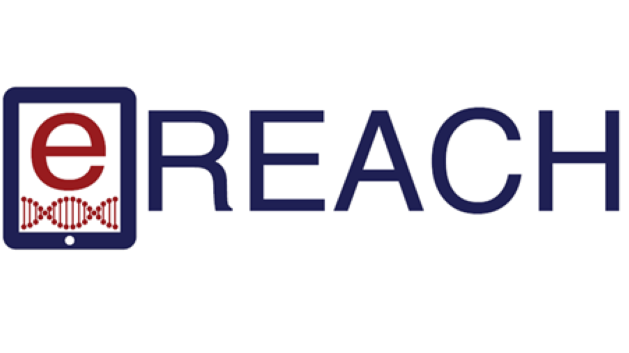A Randomized Study of an eHealth Delivery Alternative for Cancer Genetic Testing for Hereditary Predisposition in Metastatic Breast, Ovarian, Prostate and Pancreatic Cancer Patients

Brief description of study
This study aims to determine if web-based eHealth delivery of
pre-test and/or post-test counseling in cancer patients who have not had previous genetic testing can provide equal or improved cognitive and effective
outcomes when compared to the standard of care delivery model.
eReach is a randomized study. Participants will have a 25% chance of being placed in any
of the following four groups. Patients
throughout the country can participate in the eReach study. All study
interventions, including genetic counseling, are provided by staff at the
University of Pennsylvania.
|
ARM
|
Pre-Test Session
|
Result Disclosure Session
|
|
ARM A
|
With a Genetic Counselor
|
With a Genetic Counselor
|
|
ARM B
|
With a Genetic Counselor
|
Using the Web-Based eHealth Tool
|
|
ARM C
|
Using the Web-Based eHealth Tool
|
With a Genetic Counselor
|
|
ARM D
|
Using the Web-Based eHealth Tool
|
Using the Web-Based eHealth Tool
|
The
Pre-Test Genetic Session will include information on the following:
- Reasons and Benefits for genetic testing in patients with metastatic breast, ovarian, prostate and/or pancreatic cancer
- What types of clinical genetic testing that are offered as part of this study
- Risks, Benefits and Limitations of genetic testing
When randomized to Arms A or B, participants will be asked to schedule a virtual or in-person
appointment to speak with a Genetic Counselor for pre-test genetic
counseling session. If randomized to Arms C or D, participants will be provided
instructions for obtaining a private code to access the Web-Based eHealth Tool.
Even when assigned to the web-based tool, study participants can still request to speak
with a genetic counselor.
When participants
choose to have genetic testing, regardless of assigned Arm, they will
receive Result Disclosure once genetic test results become available.
Information provided during the Result Disclosure will include:
- Clinical genetic test results
- Implication(s) of results for your treatment
- Implication(s) of results for your relatives such as screening and prevention recommendations, lifestyle changes and potential testing recommendations
If randomized to Arms A or C, participants will be asked to schedule a virtual or in-person
appointment to speak with a Genetic Counselor for your Result Disclosure
Session. Those randomized to Arms B and D will be provided instructions for
obtaining a private code to access the Web-Based eHealth Tool, but can still
ask to speak with a genetic counselor.
Detailed description of study
After
providing consent, participants will be asked to provide detailed information on their
family history of cancer and possibly other diseases. Once completed, participants
will be assigned to one of four different ways to get genetic counseling and
testing. Some patients will speak to a genetic counselor to learn about testing
options and receive their results. These
sessions are mostly completed virtually, in the comfort of participants’ homes.
Others will be given the opportunity to review this same information by web.
All patients will be able to speak to a genetic counselor, at any point, at no
charge. If testing is desired, a genetic
counselor will coordinate. The cost of testing is often completely covered by
insurance for individuals who meet testing guidelines. Participants will be asked to
complete Surveys at the time of consent, immediately after your Pre-Test
Genetic Session, immediately after your Result Disclosure Genetic Session and
at 6 months after your Result Disclosure Genetic Session.
Eligibility of study
You may be eligible for this study if you meet the following criteria:
-
Conditions:
Metastatic Breast Cancer,Metastatic Prostate Cancer,Advanced/Metastatic Ovarian Cancer,Advanced/Metastatic Pancreatic Cancer
-
Age: Between 18 Years - 100 Years
-
Gender: All
- Speak and understand English
- A personal history of one or more of the following:
Metastatic Breast Cancer
Advanced Ovarian Cancer (Stage III-IV)
Advanced Pancreatic Cancer (Stage III-IV)
Metastatic Prostate Cancer
- No previous cancer germline genetic testing
Updated on
14 Jul 2023.
Study ID: 833370